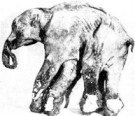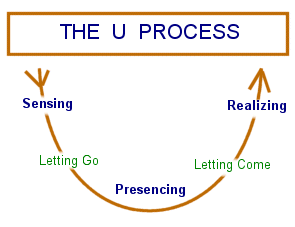Forums for Transformation - Who Killed Benny?
 “Benny was a woolly mammoth who was found frozen solid in Siberia. Benny died thousands of years ago in July. This year Benny appeared in the movie 'The Day After Tomorrow' - although his acting was a little stiff. Benny had a smashed hip, a broken leg and still had buttercups and flowering beans in his mouth that he was dining on for lunch when he was killed. Thousands of mammoths and other animals died with Benny. Who or what killed Benny and his friends? ”
“Benny was a woolly mammoth who was found frozen solid in Siberia. Benny died thousands of years ago in July. This year Benny appeared in the movie 'The Day After Tomorrow' - although his acting was a little stiff. Benny had a smashed hip, a broken leg and still had buttercups and flowering beans in his mouth that he was dining on for lunch when he was killed. Thousands of mammoths and other animals died with Benny. Who or what killed Benny and his friends? ”
This year saw record participation in our school’s online ‘Mystery Forums’ designed to promote transformative learning experiences for adolescents.
Why transformative learning? Until recently transformative learning has been the province of adult learning theory but there are several reasons to consider its inclusion for senior-secondary students transitioning into early adulthood.
Firstly, the transition to adult life often involves personal transformation as students move from a safe school environment to take on complex work, study and social responsibilities. Transformative learning equips students with the concepts and understanding necessary to make a success of this transition.
Secondly, when students are led to a deeper understanding of concepts and issues their fundamental beliefs and assumptions may be challenged leading to a transformation of perspective or worldview. Students who understand the nature of transformative learning may be better prepared for this process.
Thirdly, as we ask students to develop critical and reflective thinking skills and encourage them to care about the world around them they may decide that some degree of personal or social transformation is required. Students will need the tools of transformative learning in order to be effective change agents. Otherwise students may feel disempowered, become pessimistic about the future, fear change, or develop a degree of cynicism towards those who promote change.
Finally, we are living through a period of transformational change in society and culture. Students will be better able to deal with such change in their lives if they understand the nature of transformational change and the impact it has on individuals, groups, organizations and nations.
One of the many triggers for transformative learning experiences is a disorientating dilemma – a paradox, enigma or anomaly.
The popular ‘mystery forums’ allowed students to playfully question assumptions and worldviews through 10 dilemmas in an online forum. For example “Who Killed Benny?” is about the demise of mammoths in Siberia, Alaska and S. America thousands of years ago.
Students spent several weeks considering a wide range of possible scenarios from over-hunting to snap freezing to tsunamis to climate change to pole-shifts to disease and more… During that time they realised that there were many unquestioned assumptions and unchallenged worldviews underpinning the science and critical inquiry surrounding this issue.
Other dilemmas included:
- “Where’s My Mummy” – a look at the Great Pyramid
- “Is it a bird? Is it a plane? No it’s …? – a look at myths of flight through pre-history.
- “Ancient Maps of the World?” – a look at the Piri Re'is and other maps.
In a chapter titled Learning to Think Like an Adult in Learning as Transformation Mezirow claims that transformative learning leads to greater competence in:
mindful learning
autonomous learning
self-directed learning
critical
reflection
self-knowledge
reflective discourse
dealing with change, transformation and uncertainty
dealing with "meaning perspectives" and worldviews
social responsibility
decision-making and problem solvingMost, if not all, of these are highly valued in emerging “21st century” curriculum for adolescent learners. I believe that online "mystery forums" can provide a useful, playful and safe learning environment for some aspects of transformative learning for adolescents.
Labels: ICT tools, transformation




